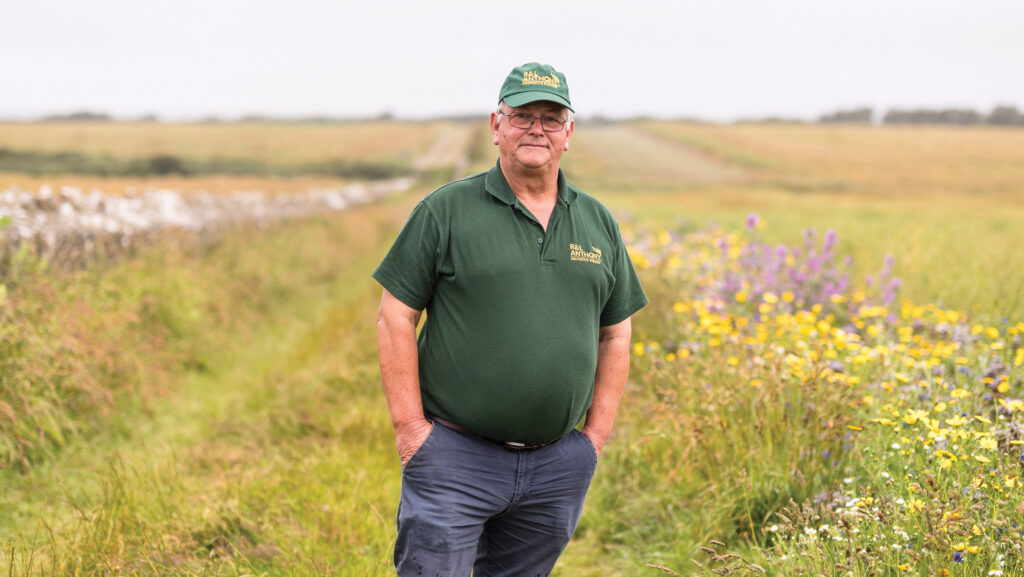Farmers Weekly Awards 2025: Arable Farmer of the Year
 Farmers Weekly Awards 2025 Arable Farmer of the Year © John Wellings
Farmers Weekly Awards 2025 Arable Farmer of the Year © John Wellings Richard Anthony of Tythegston Farm, Bridgend, Wales is the winner of Farmers Weekly Awards 2025 Arable Farmer of the Year.
Rainfall exceeding 57 inches a year and fields running right up to the South Wales coast are very challenging conditions to grow high yielding cereal crops.
However, Richard and Lynn Anthony are doing just that.
They have earned a reputation amongst local land owners for turning around unproductive land.
See also: FW Awards: Meet the 2025 Arable Farmer of the Year finalists
Farm facts
- Area 1,370ha of arable cropping
- Cropping includes winter wheat, oilseed rape, maize and Westerwold ryegrass
- Establishmen tMzuri Protil 4m strip-till drill for OSR, 6m Horsch Avatar disc drill
- SoilsShallow soils – ranging from sands to heavy clay
- StaffRichard, Lyn plus five staff
Challenges
Richard started out as a livestock farmer renting land and then in 2001, he embarked on arable farming.
Over the years he has developed his system which can cope with the extreme, wet weather.
Harvesting crops is a key challenge and a study tour of Aberdeenshire offered some pointers.
He invested in a biomass boiler for drying and runs a high capacity New Holland CR90 rotary combine with a MacDon Draper header.
Another challenge was improving the depleted soils he took on, some of which had organic matters as low as 1%.
“You needed tennis racquets on your feet to walk across fields” and crops also struggled in dryer spells with the shallow soils.
Cropping system
He widened the rotation and started to add organic matter applying turkey muck, digestate and he ensures there are always roots in the ground with cover crops and rye on heavier ground before maize.
Compaction is minimised by running tractors and kit with low tyre pressures and using 24m permanent tramlines.
Cultivations have also been reduced by strip tilling OSR and direct drilling other crops where possible.
Effectively, nine crops are grown in six years by double cropping maize and Westerwold rye. Winter wheat and OSR are his combinable crops.
He runs a four-cut system on the Westerwold rye producing 8,000-10,000t of forage and hay, while the rye also offers winter sheep grazing.
Septoria is the top disease threat and he selects varieties with insights from the trials he hosts, as breeders put wheats through their paces.
He is also prepared to invest in the latest fungicides.
The final challenge is salt burn. Richard recalls losing 61ha of wheat one year.
Narrower row spacings to keep crops standing, higher seed rates and silicon, which helps harden cell walls, have all reduced the risk.
Results
The result is that yields are increasing. “We were struggling to hit 7.4t/ha and now the rolling average for wheat is close to 9.9t/ha. Oilseed rape is averaging 4.5t/ha and maize averages 42-45t/ha.”
Soils organic matters have increased, with fields averaging 6-8%.
The combination of reduced cultivations, dramatically cutting fertiliser use by using digestate and renewable energy to dry grain means he has cut his carbon footprint.
Richard is making the most of local markets with maize grown for a local dairy farm and wheat is sold to a local mill.
He has also successfully developed new markets including selling clamp silage (wrapped) to local farmers and barn-dried hay for racehorses in northern England.
Winning ways
- A first generation farmer who has achieved so much
- Turning around unproductive land
- Good looking crops, especially oilseed rape
- Top of his game on soil management
- How biomass heat benefits both grain and forage enterprises
- Adoption of technology like variable seeding
What the judges say
“A first-generation arable farmer, Richard has achieved a huge amount in that time and is top of his game on soil management. We liked how he was extracting the most value out of the biomass boiler, benefiting the whole business.”
The other finalists
- Andrew Booth, Savock Farms, Aberdeenshire
- Charles Quick, Keirles Farm, Somerset
The Farmers Weekly 2025 Arable Farmer of the Year Award is sponsored by Nitrasol

The Farmers Weekly Awards celebrate the very best of British agriculture by recognising hard-working and innovative farmers across the UK.
Find out more about the Awards, the categories and sponsorship opportunities on the Farmers Weekly Awards website.

